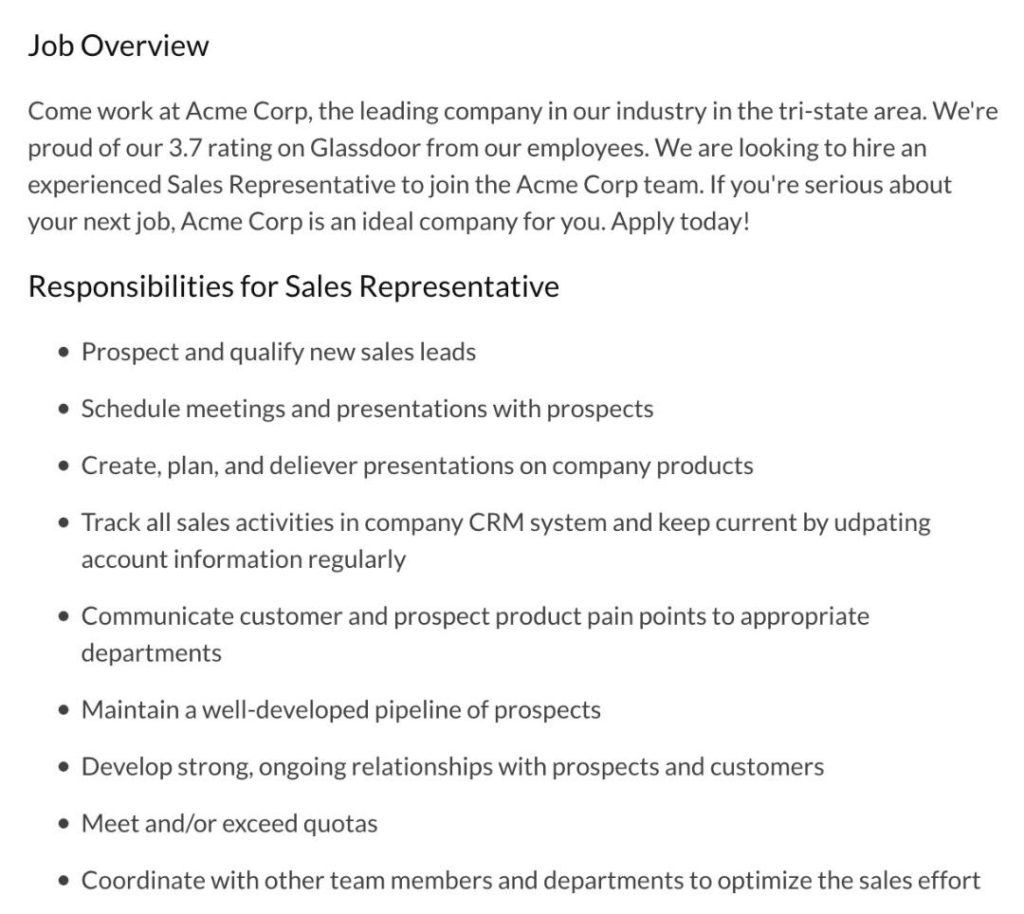
Looking for a sales job or interested in taking the next step in your sales career?
Chances are, you have a lot of competition. Sales jobs are in high demand, with more and more people interested in the flexibility and the monetary rewards that sales roles can bring. For applicants, this means one thing: Creating a detailed, well-structured resume is key if you want to increase your chances of landing a job.
Fortunately, if you’ve been in sales for any length of time, selling is what you do. And if you’ve mastered the art of selling a product, transitioning to selling yourself is simply a mind shift. To help you present your best self on paper, here are 10 tips for writing a sales resume that will get you the job.
1. Focus on numbers
In sales, metrics are everything. Use key numbers and figures on your resume to prove to potential employers that you know how to get results. Choose the stats that are the most impressive, whether that’s dollar amounts or percentages.
Then include those numbers in context, adding a statement that shows the long-term effects of the sales you made. Including these metrics is a great way to quantify the value you can bring to a company.
- Boosted territory’s market sales from under $450K in 20202 to $3M+ in under two years by establishing and cultivating key relationships with regional distributors.
- Successfully bid and negotiated contracts ranging from $90K to $3M per project. Developed new territory into third most profitable in southern region within first year with company.
- Grew overall ARR to $9.5M; generated $6M+ in total net new business and expansion revenue.
- Boosted unit sales by 9% while increasing profit margin by 14.6% over TTM; exceeded sales quota by 57% over same time period.
- Added 700+ new customers across SMB, Mid-Market, and Enterprise, increasing overall number of paid customers by 78%.
- Notable $50K-$100K Enterprise wins include Target, Walmart, IBM, Costco, and Amazon.
2. Be specific about your experience
To convince a hiring manager you’re the right person for the job, get specific about why, sharing the nitty-gritty details of your experience that set you up to easily step into a new role.
List each of your previous positions and add a few bullet points under each one where you can include the specifics of your responsibilities. Helpful details might include:
- Types of products you’ve sold
- Types of customers to whom you’ve sold
- Regions in which you’ve sold
- Length of average sales cycle
- Quota achievement
Be descriptive about what you’ve done so hiring managers can fully understand the experience (and the value) you bring to the table.
3. Highlight your skills
Creating a section to highlight relevant skills is a smart way to show employers you have the expertise it takes to shine in the position they’re trying to fill.
In the sales industry, these skills might include things like direct experience with specific CRM’s and other relevant technology, strong interpersonal skills, or a thorough understanding of industry dynamics.
Think about what you’re good at and how those skills could translate to your target sales job. That’s what you want to add in this section of your resume.
4. Cover your education
While a formal education doesn’t always translate to sales success, we always recommend including your educational background on your resume. This is the place where your bachelor’s degree as well as any further education will go.
Don’t feel like you have to limit this section to only formal degrees — additional sales-based certifications or courses are relevant, too. Looking for courses to take? Check out our post on the 25 Best Online Learning Resources for Skill Development.
5. Mention software experience
If you work in the sales industry, you already know that software experience is extremely important. The CRM industry alone is projected to reach over $80 billion in revenue by 2025. Lead gen tools and communication applications (think Asana or Trello) are commonly used in sales positions, too.
What does this mean for you? If you have experience with any type of software used in the sales industry, flaunt it! List the tools you’re familiar with and know how to use. If you haven’t used sales software before, add a line on your resume reassuring potential employers that you learn fast.
6. Talk the talk
Show hiring managers you know what you’re talking about by incorporating sales industry-specific keywords into your resume. This might include words and phrases like:
- Competitive analysis
- Contract negotiation
- Cross-selling
- Customer retention
- Deal negotiation
- Lead management
- Post-sales support
- Prospect qualifying
- Sales cycle management
- Sales forecasting
Sprinkling these key phrases throughout your resume will subtly show off your knowledge of the industry.
7. Consider structure
Once you’ve gathered all the information you want to include, make sure you structure the info in a way that’s visually attractive and easy to read. You want your resume to be scannable, where it’s easy for someone to take in the most important information at a glance.
A chronological resume format is easiest for hiring managers to follow. With this format, you’ll list your information in the following order:
- Name and contact info (email, phone number, city, and state)
- 1-2 sentence summary
- Work history (listed in reverse chronological order)
- Educational history
- Miscellaneous information (skills, awards, etc)
Taking the time to design a well-structured resume will up the chances of your resume being read and sinking in.
8. Study the job description
The hiring manager is telling you exactly what they’re looking for, down to the last detail. In other words, they’re giving you the answers to the test. Don’t say “no, thank you” — take advantage of this, using the job description like a cheat sheet.
Make sure you highlight the most relevant aspects of your background based on the job description. Is the company looking for strong communication skills? Highlight your experience giving presentations, negotiating deals, and providing feedback to other employees. Does the brand want you to learn how to use their sales system? Mention how you learned a new system at your last job.
If your job search takes you through dozens of sales job postings, you’ll probably start to notice trends over time. This will help you get a feel for what most hiring managers want to see from their sales industry candidates.

9. Keep it short
Your resume shouldn’t be 10 pages long. No one is going to read that. The idea of a resume is to have a brief, easy-to-digest summary that includes all of the most important details in one place.
Your resume should be the appropriate length for your experience. If you’re a new grad or have fewer than five years of experience, your resume doesn’t need to be longer than 1-2 pages. For someone with over 10 years of experience, a 2-3 page resume might be necessary. But in general, it’s important to keep the document concise.
10. Make tweaks if needed
Once your resume is finished, it doesn’t have to stay static. Tailor your resume so it’s hyper-relevant for each individual sales job opportunity.
The changes you’ll make shouldn’t affect the overall structure of your resume or drastically alter its content; it would take too much time to start from scratch for every job. But with a few small edits, you can make sure your resume is the best fit possible for each job description.
Need more help creating a resume that gets noticed?
If you’re ready to land your dream job, please reach out to our team at ResumeSpice today. We’d love to work with you to develop a resume that gets you noticed by top companies. You can reach us by phone at 832.930.7378 or contact us online.






